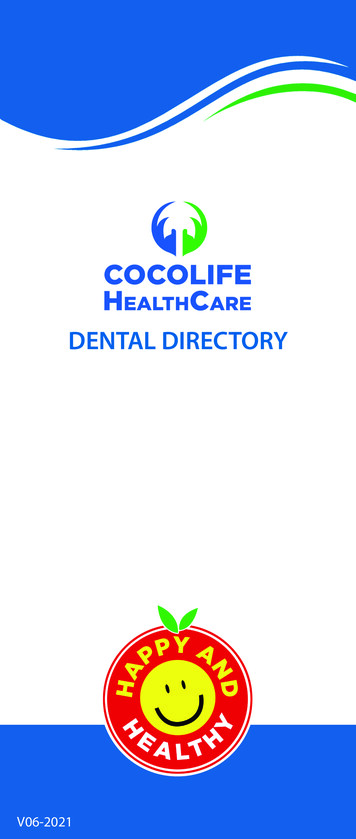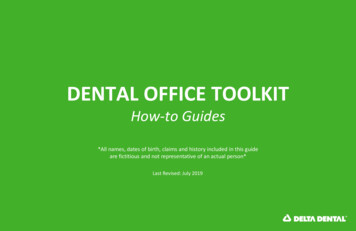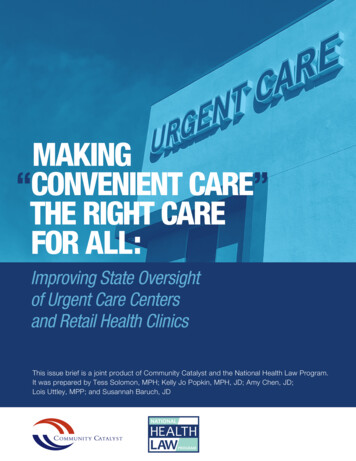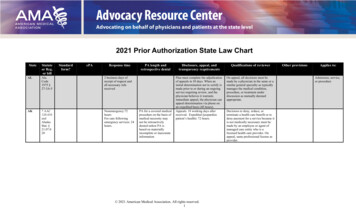
Transcription
Commissioning Standardfor Urgent Dental CareNHS England and NHS Improvement
OFFICIALEquality and health inequalities statementPromoting equality and addressing health inequalities are at the heart of NHSEngland’s values. Throughout the development of the policies and processes cited inthis document, we have:Given due regard to the need to eliminate discrimination, harassment andvictimisation, to advance equality of opportunity, and to foster good relations betweenpeople who share a relevant protected characteristic (as cited under the Equality Act2010) and those who do not share it; andGiven regard to the need to reduce inequalities between patients in access to, andoutcomes from healthcare services and to ensure services are provided in anintegrated way where this might reduce health inequalities.page 2
OFFICIALCommissioning Standard for Urgent Dental CarePublishing approval number: 000036Version number: 1.0First published: July 2019Prepared by: OCDOThis information can be made available in alternative formats, such as easy read orlarge print, and may be available in alternative languages, upon request. Pleasecontact england.ocdo-pmo@nhs.net.page 3
OFFICIALContentsEquality and health inequalities statement . 2Contents . 4Executive summary. 6Foreword. 71Introduction . 81.1 National policy on urgent care . 81.2 Purpose and objectives . 81.3 Expected outcomes. 91.4 Expected benefits . 92 How the standard was developed . 103What is urgent dental care? . 104Assessing local needs and current service provision . 115Commissioning standards for urgent dental care . 135.1Scope . 135.2Audience . 135.3Roles and responsibilities . 135.4Contracting mechanism and payment approach . 146 Standards of delivery. 156.1Access to urgent dental care . 156.2 Information technology systems . 166.3 Assessment . 166.4 Advice . 176.5 Treatment. 176.6 Improving referral pathways . 187 Supporting standards . 197.1 Access to records . 197.2 Business continuity. 207.3 Clinical decision support system . 207.4 The directory of services . 207.5 Clinical governance . 207.6 Workforce. 218 Quality improvement . 21References . 23Project Board Membership . 24Appendix A Schedule 4 of The National Health Service (Dental Charges) Regulations2005 . 25Appendix B Urgent Dental Care Service Specification . 26Appendix C Suggested key performance indicators . 36page 4
OFFICIALAppendix D Care pathway for urgent dental care services . 38Appendix E Core standards for urgent dental care services . 39Appendix F National data sets . 40Additional data sets to be addedAppendix G List of abbreviations . 41Appendix H Urgent dental care evidence review . 43page 5
OFFICIALExecutive summaryThis document sets out the standards for commissioning urgent dental care servicesin England. The standard will support NHS England in commissioning consistentpatient-centred urgent dental care services. Currently there is a mixed andinconsistent service as this was historically commissioned by each primary care trustand the volume and availability of services is very variable.The standard has been developed with patient and public input to find out theaspects of urgent care that are important to them, for example travelling times andthe type of service they receive.Implementation of the standards should ensure that patients and the public areaware of what services are available, how to access them and what they shouldexpect from the services themselves. At the moment many patients either useoverstretched general medical practice or emergency departments, neither of whichis equipped to provide effective dental care.page 6
OFFICIALForewordAnybody who has experienced severe dental pain will know how important it is to beable to make contact with a member of the dental team as quickly and easily aspossible. NHS England commissions urgent dental care services to meet this needand this Standard is intended to support them in this challenge.Our ultimate aim is that the public will know how to contact the urgent dental careservice when they have pain, wherever they are in the country. That they thenreceive a caring and proportionate response, which seeks to reassure wherenecessary and direct the caller to self-care, to the pharmacy or to a dentalprofessional as necessary based on clinical need. And that the response andoutcome will be the same wherever the patient is calling from.Patients have told us that they would prefer to talk to a dental professional and thatthey are prepared to travel if they need a face to face appointment with a dentist.They also want to know they are receiving effective treatment for their problem andhow much this will cost them.This Standard is designed to enable commissioning teams to work with the dentalprofession locally to assess the current system for urgent dental care and makechanges where these are required. The Standard is one in a series of dentalcommissioning standards produced to support the transformation of NHS Englanddental services. Each standard sets out a framework for local work and should beread in conjunction with the Introductory Guide for Commissioning Dental Specialties.With the adherence to the standardised framework for place-based commissioningwe can ensure that local NHS dental care pathways are developed andcommissioned with consistency and excellence, across the whole spectrum of dentalservice provision.The pace of transformation will inevitably vary across England with the requirementto conform to national quality standards applicable to all aspects of dental serviceprovision and all regions. In continuing with the legacy of effective collaborationbetween local commissioners, their local patient populations, the local DentalManaged Clinical Networks (MCN), Consultants in Dental Public Health and LocalDental Networks (LDN)1 achieving the nationally expected standards will not be asignificant challenge. The focus for commissioners is an assurance for localpopulations of timely access to high quality, evidence-based urgent dental care;confidence in a service designed at local level to meet local needs aligned withnational standards.Sara HurleyChief Dental Officer for NHS England1These may change as the role of Sustainability and Transformation Partnerships (STPs) andIntegrated Care Systems (ICSs) becomes clear.page 7
OFFICIAL1IntroductionThis commissioning standard aims to ensure urgent primary care dental services inEngland are high quality, responsive to local needs and deliver best outcomes forservice users. It will support development of urgent dental services that areseamless with other urgent care services to ensure people with urgent dental needsare seen in the right place and at the right time.NHS England has responsibility to ensure people have timely and appropriate accessto urgent dental care. However, under the NHS primary care dental contracts,general dental service providers are required to provide urgent dental care to patientswho are undergoing a course of treatment at the practice within a practice’s normalworking hours (appendix A).This commissioning standard supports NHS England to meets its legal duty onaccess to urgent dental care services. It supports delivery of the commitments onurgent care outlined in the Five Year Forward View and Next Steps on the NHS FiveYear Forward View and the NHS Mandate to 2020. It is important to recognise thatwhile standards of care will be consistent across the country, commissioning willneed to be responsive to local needs, informed by emerging sustainability andtransformation partnerships and local place-based clinical priority setting.This commissioning standard outlines the minimum standards to be attained andcommissioners are expected to implement the standards when procuring new urgentdental care services. Commissioners will also need to work with existing serviceproviders and agree a timetable for adoption of these standards. If commissionersare unable to implement or apply the standards they should ensure there is an audittrail of the reasons for this and the risk mitigation they have applied.1.1 National policy on urgent careIn response to the Urgent and Emergency Care Review and the NHS Five YearForward View, NHS England developed a national service specification for theprovision of a 24 hours a day, seven days a week integrated urgent care access,clinical advice and treatment service (NHS England, 2017). This serviceincorporated NHS 111 call-handling and former GP out-of-hours services and hasbeen termed an integrated urgent care clinical assessment service (IUC CAS).Responsibility for its commissioning sits with clinical commissioning groups (CCGs).The specification aimed to revolutionise how urgent care services are provided andaccessed to improve experience of, and clinical outcomes from urgent care. A keyrequirement is that arrangements are made for the management and referral ofcallers with dental symptoms.Of relevance to urgent dental care is the inclusion of dental professionals in theclinical assessment service. It is expected that in time the IUC CAS will book directlypeople into urgent face-to-face appointments where needed, which may includeurgent dental care services.page 8
OFFICIALPurpose and objectivesThe purpose of this commissioning standard is to ensure urgent dental care servicesare transformed and delivered in line with the national transformation plans for urgentcare.Objectives: define within the context of primary care commissioning the meaning of urgentand emergency dental care ensure urgent dental care commissioning is based on assessment of local needs,including the most vulnerable groups in society describe standards for the commissioning of urgent dental care describe standards for the delivery of appropriate urgent dental care ensure urgent dental care services are integrated across all urgent care services ensure outcomes of urgent dental care are monitored and evaluated ensure that available services are profiled accurately and their availability topatients and professionals is signposted on the Directory of Services (DoS) andNHS Website.1.2Expected outcomesThe commissioning standard will enable transformation of urgent dental careservices across England.The expected outcomes are: improved oral health and reduced oral health inequalities an accessible and equitable, high quality urgent dental care system responsive tolocal needs urgent dental care services aligned to other local urgent care and dental servicesand provided to national standards clarity for patient and the public on what they can expect from urgent dental careservices.1.3Expected benefitsA consistent model of urgent dental care across England that is responsive to localneeds and understood by patients, the public and health and social careprofessionals will deliver the following benefits: improved patient experience and confidence in urgent dental care servicestimely access to urgent dental care services for the publicthe right patients being seen by the right service at the appropriate time leading toappropriate treatment and relieving pressure on emergency departments and GPout of hours servicesaccess to ongoing oral healthcare for frequent users of urgent dental careservicesservice users able to resume normal activity due to prompt treatment, for examplework and education.page 9
OFFICIALWhile there is no plan to undertake a national evaluation of urgent dental careservices, key performance indicators developed and monitored locally will measurethese benefits.2 How the standard was developedTo support development of the commissioning standard a rapid review of theliterature was undertaken in relation to all elements of the standard. As well asproviding evidence to inform the transformation of urgent dental care in England, italso highlighted the continuing need to evaluate which of the different servicedelivery models provide optimal access, effective care and best patient outcomes infuture.In addition, patients and the public and NHS commissioners and providers viewswere captured through consultation workshops. These included the need to ensureaccess for people with additional care needs and for clear information on serviceprovision and how to access services.3 What is urgent dental care?Urgent and emergency oral and dental conditions are those likely to causedeterioration in oral or general health and where timely intervention for relief of oralpain and infection is important to prevent worsening of ill health and reducecomplications (Scottish Dental Clinical Effectiveness Programme, 2013). Urgentdental care problems have been defined previously into three categories: emergency,urgent and routine (SDCEP, 2007). This commissioning standard is concerned withthe first two categories only.Dental emergencies include the following conditions, which require contact with adentist or other appropriate clinician within one hour and are treated in a timescaleappropriate to the severity of the condition: Trauma including facial/oral laceration and/or dentoalveolar injuries, for exampleavulsion of a permanent toothOro-facial swelling that is significant and worseningPost-extraction bleeding that the patient is not able to control with local measuresDental conditions that have resulted in acute systemic illness or raisedtemperature as a result of dental infectionSevere trismusOro-dental conditions that are likely to exacerbate systemic medical conditionssuch as diabetes (that is lead to acute decompensation of medical conditionssuch as diabetes)Urgent dental problems include the following conditions, which should receive selfhelp advice and treatment within 24 hours: Dental and soft-tissue infections without a systemic effectpage 10
OFFICIAL Severe dental and facial pain: that is, pain that cannot be controlled by the patientfollowing self-help adviceFractured teeth or tooth with pulpal exposureRoutine dental problems include the following conditions for which self-help advice isneeded and/or access to an appropriate service within seven days if required: Mild or moderate pain: that is, pain not associated with an urgent care conditionand that responds to pain-relief measuresMinor dental traumaPost-extraction bleeding that the patient is able to control using self-helpmeasuresLoose or displaced crowns, bridges or veneersFractured or loose-fitting dentures and other appliancesFractured postsFractured, loose or displaced fillingsTreatments normally associated with routine dental careBleeding gums4Assessing local needs and current service provision Planning oral healthcare services should be underpinned by a needs assessment. Inthe context of this commissioning standard oral health needs assessment should beused to determine if current urgent dental care service provision is meeting local oralhealth needs. The method utilised for the needs assessment should aim to answerthe following: What is the health problem?What is the size and nature of the problem of the population?What are the current services?What do professionals, patients and the public and other stakeholders want?What are the most appropriate and cost effective interventions?What are the resource implications?Chestnutt et al. (2013) described a process for undertaking an oral health needsassessment and the broad stages are set out below with examples of how this canbe applied to urgent dental care.Oral health needs assessmentstages1. Establish a working groupWhat might this look like for urgent dentalcare?Including but not limited to consultants indental public health, relevant NHS Englandcommissioners and commissioners fromemerging integrated care systems andstrategic transformation partnerships,appropriate patient and publicrepresentatives and service providerspage 11
OFFICIAL2. Agree aims, scope andtimescales3. Collate existing needsassessments and other relevantinformation4. Identify and close informationgaps on health needs, relevantservice activity, workforce andother resources5. Build a comprehensive picture ofneeds and resources6. Interpretation of the information toidentify unmet needs and agreepriorities for potential action tomeet these needs7. Identify shared priorities for actionthat are locally appropriate andconsult on these8. Action plan to address priorities9. Implement action plan to meetlocal needs10. Evaluate actionsTo describe the urgent dental needs anddemands of the people within a givengeographic region in order to inform potentialunmet needNational and regional figures for urgentdental conditions can be found in thedecennial adult dental health surveysSeek out local data on need for urgent dentalcareMap urgent dental care demand and activityfrom current services (BSA data), NHS 111,hospital data and data from general medicalpracticesEstablish if there are any existing urgentdental care pathwaysConsider work to engage thepopulation/community of interest and otherstakeholders, for example providers ofurgent dental care servicesSet out the urgent dental care needs of agiven population including: prevalence distribution inequalitiesSet out demand for current servicesSet out scope, activity and resources ofcurrent servicesSet out views of service users and otherstakeholders.Set out met and unmet need in relation tourgent dental care and agree on possibleservice developments to address any unmetneed within local resource envelope.A local implementation group should beconvened to consult on and agree prioritiesand develop an action plan. Any actionsshould be in line with the appropriateevidence base, for example on use ofantibiotic to treat dental pain and localcontext to ensure greatest impact fromavailable resources.Implementation of action plan andcontinuous monitoring and qualityimprovement. Data monitoring requirementsand performance indicators should facilitateevaluation against the aims of the service.Evaluate at appropriate time, for examplewhen considering contract extension or reprocurement.page 12
OFFICIAL5Commissioning standards for urgent dental care5.1ScopeThis commissioning standard has been developed to assist commissioners to designand procure consistent clinical urgent dental care services to meet the needs ofpeople presenting with dental emergencies and urgent dental problems as defined insection 3 above.Urgent dental care services should be commissioned for all the local population,including vulnerable groups, to ensure equity. Visitors to the area including thosefrom overseas should also be able to access the services.Routine dental problems, also defined in section 3, and call handing and triageservices are outside the scope of this standard.5.2AudienceThis commissioning standard is written for dental commissioning teams to considerand implement as required to meet local need in partnership with their local dentalnetwork. This will include active participation from the local Healthwatch and otherlocal patient representative groups and other NHS England commissioners includingdirectory of service leads. Participation will also be needed from partners in PublicHealth England (PHE), Health Education England, local urgent dental and medicalservice providers, providers of community dental services, providers of primary andsecondary dental care, local dental committees, clinical commissioning groups,sustainability and transformation partnerships and emergent integrated care systems.5.3Roles and responsibilitiesNHS England dental commissioning teams should assess current service provisionagainst this standard and prioritise the implementation taking into account currentcontractual commitments accordingly. They will need to work within the newlyemerging placed-based commissioning structures in assessing local needs andsetting local priorities. They will also need to work with local consultants in dentalpublic health to understand the need for services and engage with the public tounderstand their views and requirements. They should work within emergingintegrated cares systems engaging with local and regional groups involved in urgentand emergency care, including directory of service leads, clinical commissioninggroups and local authority commissioners to engage with place-basedcommissioning on urgent care to align services. The local dental network will providean effective mechanism for engagement, clinical leadership and prioritisation.Where there are local urgent dental care managed clinical networks in place, theseshould be engaged as a first step and should be actively involved in implementation.They will have information on current local service provision and local inconsistencesand issues. Where there are no urgent dental care managed clinical networks, thepage 13
OFFICIALlocal dental network should give consideration to establishing one or more dependingon local geography and pathways, as this will assist in implementation, qualityassurance and ongoing monitoring and review of urgent dental care services.There is an important role for NHS England in publicising the arrangements forurgent dental care so that everyone is clear about how to access the service andwhat to expect when they do. This includes the NHS charges that will be payable andinformation on entitlement to free treatment and how to receive help with healthcosts. It also includes the expectation that definitive treatment will be provided wherepossible and appropriate antibiotic stewardship will be in place. This should be donejointly with local clinical commissioning groups, for example across a sustainabilityand transformation partnership footprint. Local communications teams shouldsupport this work.The local dental and health economies also need to be familiar with thearrangements for urgent dental care to ensure appropriate signposting.Health Education England will be involved in the local dental network and shouldconsider the workforce development needs that arise from the review of currentservices and design of future services. The whole dental team can and should beinvolved in urgent dental care provision and this should be reflected in localworkforce plans.PHE should also be involved in the local dental network and should be approachedfor advice on the local needs assessment.All general dental service and personal dental service providers should maintain anup to date entry on the NHS website. Local mechanisms will need to be in place toensure any updates are also captured in the directory of services. This is essential,as patients and NHS 111 should be able to rely on these as effective ways of findinga local dentist for routine care.5.4Contracting mechanism and payment approachCommissioners should use a personal dental service agreement as the appropriatecontract mechanism for urgent dental care services. Commissioners shouldrecognise that the provider is being commissioned to deliver a relativelyunpredictable service and will be required to make available appointment slots to befilled at short notice. A sessional commitment (for a certain number of hours whenthe provider will accept an agreed number of patients) with the inclusion of keyperformance indicators (KPIs) would be appropriate. It is anticipated that the majorityof service provision will be commissioned in normal working hours, with out of hoursservices commissioned to provide care during weekends and bank holidays.Patient charges will apply to urgent dental care services in line with The NationalHealth Service (Dental Charges) Regulations 2005 and providers should be expectedto collect these.Length of contract will be a local decision and should be in line with NHS England’s,standing financial instructions and should be long enough to enable stability ofservices.page 14
OFFICIALCase study 1 LondonNHS England (London Region) inherited the legacy of 31 urgent dental care models inApril 2013. Inconsistencies existed in provision and not all boroughs had in place a dentalnurse triage service. A pan-London needs assessment was undertaken in 2014/15,modelled on the areas of London that historically had dental nurse triage services. Callvolumes were estimated and assumptions made about patient end-points, for exampletelephone advice given and booked into an urgent dental care treatment slot). In 2015/16three new dental nurse triage services (North and South London plus an overnightservice) were procured and went live in April 2016. Running in tandem to the dental nursetriage project was another project to ensure that sufficient urgent dental care treatmentslots were available. A competitive procurement exercise took place in 2016/17 to seekdedicated urgent dental care slots in existing general dental practices. NHS England(London Region) regularly meets with its dental nurse triage provider to ensure that urgentdental care treatment capacity meets demand. The current system has proven to cutdental presentations at London EDs. Both commissioning projects have driven aconsistent patient offer for Londoners and make full use of the national NHS 111 numberfor a single point of access. The dental nurse triage service is commissioned through astandard NHS contract which is demarcated into three areas, north London, south Londonand an overnight service. The dental nurse triage contract is an amalgamation of a blockof 145,000 calls per year and 10.50 per call above this volume. It is very difficult t oascertain how many calls are received per year. The urgent dental care treatment slotsare commissioned through a combination of a fixed retainer (145,000 calls), units of dentalactivity, which is 1.2 for an urgent treatment, and sessional costs. During bank holidays,costs are doubled. The challenge for the region has been assessment of local needs,which will be reported on imminently, and service evaluation, which will go through theemerging integrated care systems.6Standards of delivery6.1Access to urgent dental careInformation on how to access urgent dental care should be available for everyoneand be designed to overcome physical, language, cultural, social or other barriers.Access to urgent dental care services will be through NHS 111 or NHS 111 online,which are available 24 hours a day, seven days a week. Dental commissioners willneed to work with clinical commissioning groups to ensure NHS 111 services locallyinclude appropriate dental call handling and clinical triage. Direct booking into theurgent dental care service should be established where possible within therecommended ti
an accessible and equitable, high quality urgent dental care system responsive to local needs urgent dental care services aligned to other local urgent care a nd dental services and provided to national standards clarity for patient and the public on what they can expect from urgent dental care services. 1.3 Expected benefits










